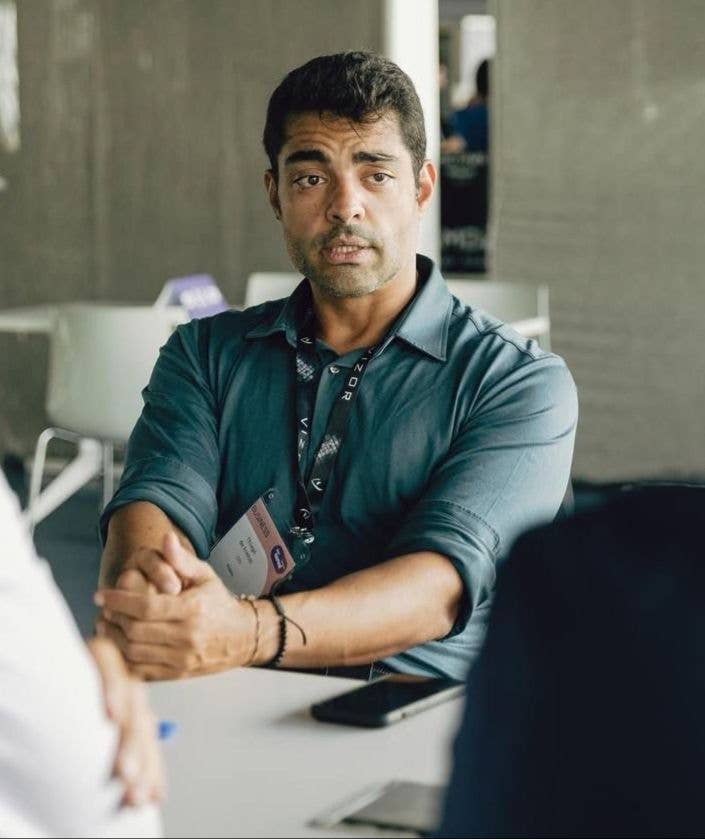How Brazil's new legal framework for games will change the industry
Trade bodies and developers talk us through the new opportunities for growth and investment unlocked by this "game-changing" legislation
During the opening session of Gamescom Latam, Carolina Caravana – vice president of Brazilian games trade body Abragrames – said the history of the nation's games industry would now be split into two periods: before and after 2024.
The turning point? The adoption of a new legal framework in May that redefines video games in the eyes of the law, opens up new incentives for games companies, and creates additional opportunities for investment, among other things.
Dry as 'a new legal framework' may sound, the excitement for its impact on the local games industry is palpable when you speak to Brazilian developers, with the term "game changer" used frequently.
"We're calling it phase two of the Brazilian games industry," says Abragames president Rodrigo Terra. "We've had the boss fight, now we have the next level."
Eros Silva of trade body Apex Brasil adds: "This legal framework opens new perspectives when you try to be a safe place for companies, for the government to understand what the gaming industry is, and a safe place for investors to come to Brazil.
"This kind of legal framework [is] trying to dismiss misunderstandings of what gaming companies are, or what bad companies are."
The framework means that companies can now be defined as a video games business rather than a 'software company that makes video games'. This will mean they have their own code number within the CNAE (National Classification of Economic Activities), and also different tax rules compared to other software businesses.
"We now have the opportunity to have Brazilian states looking into games from an economic perspective," Terra explains. "Many other countries were doing that ten, 15 years ago: the UK, France, Germany, the United States, even South Korea. Those governments were creating [hubs], tax incentives, tax relief, and operations that would help games companies perform better."
Games have also been classed under 'culture,' opening new avenues for grants and funding. A line has even been drawn between video games and gambling or sports betting titles, making it easier for the industry to differentiate itself from that sector.
This is the most significant step forward for the Brazilian games business since it was recognised by the government as a bona fide industry in 2003. And the framework is the result of a long fought campaign by trade bodies and developers alike.
"We'll spend about two years implementing everything, but when it's finished, I think we'll have the best place in the world to start and work in a games company"
Rodrigo Terra, Abragames
Thiago de Freitas – CEO and founder of Kokku, one of Brazil's largest studios – did much of the lobbying during his years working directly with the Brazilian government as part of the National Commission for Culture. Much of the work that has gone into the framework has been about identifying "what we could do to make the Brazilian industry healthier for [developers]," he says, as well as addressing a key disparity in the market's performance.
"We're one of the ten biggest countries when it comes to expenditure on games, but we're not even close to that when it comes to making revenue for the video games industry here," De Freitas says. "We're now finally in a position where we can get investment and real opportunities to access equipment that has been so hard for us to access, such as dev kits, test kits."
As discussed in our Brazil Games Week opening feature yesterday, ongoing limitations on technology imports makes it harder for creators to bring console development kits into the country – hence the local studios primarily developing for PC and mobile. Terra tells us of teams waiting six months for authorities to clear dev kits that were stuck at the airport, but hopes this will be addressed in the near future.
De Freitas adds that the distinction between games and other tech or entertainment industries will also be a crucial advantage: "We do now have an opportunity for video games to be seen as a real industry, not just part of some other industry like film or technology. It's going to help build the right policies that are only for the video games industry when it comes to investment, bringing in equipment, and making sure we're not being taxed because this equipment is not made in Brazil. Having this kind of investment and all of the tax incentives, it's going to be a game changer for Brazil."

As we've seen with many markets in the world, such as the UK and Canada, the introduction of tax incentives can be a real boon for the games industry, helping to fund studios and projects that might otherwise have struggled. De Freitas adds that since many of Brazil's largest studios, including Kokku, are built around work-for-hire services, tax incentives can help them pay better salaries and thus offer larger, more experienced teams to their clients.
"If you're paying really high taxes here because of the employment labour laws, you can't be that competitive and you can't pay the kind of salaries you'd need to compete with European and North American companies," he says.
Chris Bergstrasser, chief strategy officer at Kokku's new UK-based parent OV Entertainment, adds that changes to the tax structure will also make it easier for overseas companies to invest in Brazilian studios.
"In the past, Brazil companies had to do cash accounting instead of accruals, and because of that you'd see companies reporting loss after loss and then a magic profit towards the end," he explains. "That's detrimental to a company being able to reinvest in itself and continue that growth path, and as an outsider trying to invest in, it makes it very difficult for us to know where to invest. All we can see is companies losing money and then something happens but we're not sure what's going on.
"That's changed a lot to the point where you're now seeing foreign investors – including myself – looking at Brazil with different eyes."
Julianna Brito runs Indie Hero, an accelerator for Brazilian independent studios, which we'll be discussing more tomorrow. She says that, prior to the legal framework, Brazilian indies were essentially "invisible to foreigners," adding that the ability to register a games company will go a long way to making them more accessible to partners and investors.
"One of the first things investors are going to do when they come to a country they don't know is see how many companies there are," she explains. "Because [if] there are many companies they [think], 'Oh, this market is developed there, because there are many companies'.
"I talked with some German investors once, they came to research Brazil, and they said, 'No, there are no game companies in Brazil, there is no market data, no one is going to invest there'. But now we are no longer invisible to foreigners. They will see that we exist as a market. And it will give them more security to also bring private funds."
But Abragames' Terra warns that introducing tax incentives is no easy task. Lobbyists for Brazil's games industry learned a lot from the journey to tax breaks seen in the UK, Germany, France, and Belgium, he says, adding that Brazil's current tax structure adds additional barriers.
"From a federal level and a state level, our taxation here is really a mess," he says. "They are [making changes] to be closer to what Europe and the US does for consumer goods and productivity companies. The Tax Renewal Law that's going to be implemented in 2030 will simplify a lot of our taxes.
"Having that tax relief conversation now may be something that becomes old in two or three years and we'd need to do it again. So no one is talking about it just yet. It will take years to talk about it. We need to figure out other ways to create more incentives and attract more investment from [the] outside."

While tax breaks may not be on the immediate horizon, Brazilian developers are keen to explore other ways they can gain new access to funding and investment. Kokku's De Freitas says that interest rates in Brazil are so high, it's "quite impossible" for studios to get a loan. This is just one of the reasons he's hoping the government will help find new ways to invest in games companies.
"There's no strong industry if you don't have really close relationships with the government and have them support the growth of your industry with tax incentives, grants, making the environment for entrepreneurship less complicated, and more focus on teaching youth how to enter this industry," he says.
"Brazil has a large population, but we still don't have proper education for working on AAA games, for example. For us to change that, we need to start incentivising more companies to invest in Brazil, and for that to happen they need to see a healthier environment so they know it's safe for them to put their money here. Then we'll see more Kokkus appearing here."
Brito adds that, just as indies have been invisible to overseas partners and investors, they have also struggled to gain the attention of the government.
"Every time we were going to talk to [the government] about funding, they'd say 'Who are you? You don't exist, there are no companies.' Now we can exist and say, 'Hey, there are 1,200 games companies in Brazil that are providing 20,000 jobs, and we need this.' We can actually, as a community, work with the government in several areas to get specific projects [going]."
That's not to say government support has been lacking prior to this framework. We'll be publishing our interview with the São Paulo State Secretary for Culture, Creative Economy and Industries later this week, who discusses how that state is aiding the games industry, while Apex Brasil's Silva reports there are already funding programs in various Brazilian states.
"We now have an opportunity for video games to be seen as a real industry, not just part of some other industry like film or technology"
Thiago de Freitas, Kokku
The full impact of the framework will take years to be understood, but for now Brazilian developers are confident it will give them a leg up on the global stage. Terra even describes it as the "most contemporary and modern [games] legislation in the world."
"Governments need to put things in boxes, and which box do you put games in?" he says. "It was under software, and now is it culture or technology? No, it's both. Games are games. It cannot be split. It's the first time a law has had this understanding."
This is, of course, just the beginning. With the bill for the legal framework passed in May, it's now going to take some time for the government to implement it. This work has already begun, with the interministerial work groups that will tackle this currently being organised.
"I think we'll spend about two years implementing everything, but when it's finished, I think we'll have the best place in the world to start and work in a games company," says Terra.
Looking further ahead, Apex Brasil's Silva hopes the framework will enable the Brazilian games industry of the future to further diversify. In addition to traditional games developers, there are studios dedicated to advertising games, as well as the aforementioned work-for-hire and services companies.
"The game will change for Brazil for the next five years," he says. "We are going to see the small companies being invested in, creating more jobs, helping the economy, and bringing more dollars to Brazil."

